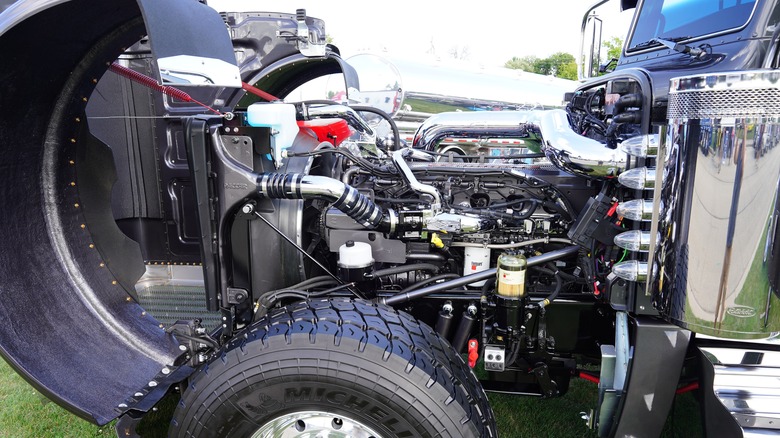
Vitpho/Shutterstock
Semi-trucks are crucial for getting goods across the U.S., and in 2022, semis achieved $940.8 billion in freight revenue, per TruckInfo.net. But have you ever noticed how the majority of 18-wheelers use diesel engines? Most big trucks operate with diesel over gasoline engines for specific reasons.
Advertisement
There are several things you might not know about diesel engines, such as their ability to offer robust amounts of torque at slow speeds. Diesel engines also last much longer than gasoline engines averaging around 500,000 miles or more. And diesel engines are more efficient than gas as well.
Since 18-wheelers deliver a wide range of goods from food to medical supplies to oil, some experts believe that it would only take one week without the support of the trucking industry before the U.S. would be unable to function normally. First introduced in 1898 (with a steam engine), the semi-truck continued to see improvements over the decades like the addition of the diesel engine, air brakes, and electronic systems.
Advertisement
Diesel engines offer monstrous torque

Aaron of L.A. Photography/Shutterstock
Horsepower and torque are different, and in terms of hauling heavy trailers full of supplies, more torque is preferable. Torque is the turning force that enables the wheels of the truck to begin rolling from a stop. According to onsitetruckaz.com, the average semi-trailer tips the scales at nearly 80,000 pounds when full, and 35,000 when empty. The force needed to get a fully loaded semi-truck rolling is significant, and that’s why many 18-wheeler engines feature upward of 2,000 lb-ft of torque.
Advertisement
A diesel is capable of more torque than a gasoline engine for several reasons that include its compression process, enhanced turbocharged airflow, and unique gearing. As for the compression process, diesel engine doesn’t use spark plugs and therefore the piston has a greater range of motion during engine operation resulting in quicker power delivery. To add more muscle, turbochargers transform engine performance by forcing compressed air into the system, resulting in greater output. Semis also feature upward of 12 or more gears (up to 18) to help maximize the amount of torque sent to the wheels at lower speed. Compare that with your average car which offers at most six gears.
Diesel engines are more efficient and long-lasting

5m3photos/Getty Images
Diesel engines offer a few advantages to their gasoline counterpart, such as more potent fuel. Essentially, diesel fuel packs more punch and offers upward of 15% more energy than a similar amount of regular unleaded gasoline. This more robust fuel allows semi-trucks to haul more weight and drive as much as 35% farther on a gallon. With greater efficiency, these diesel engines can save the transport industry money during normal operations.
Advertisement
In addition to being more efficient, diesel also offers increased longevity in comparison to gasoline engines. While a car may be celebrated for reaching 175,000 miles, a semi-truck’s diesel engine is just getting warmed up. The muscle under the hood of these 18-wheeler goliaths can reach remarkable milage achievements up to 800,000 miles if cared for properly.
One of the reasons for the high milage comes down to how the diesel engine is designed. Diesels feature fewer moving parts, and therefore, they don’t experience the typical wear found in gasoline engines. With less wear these trucks don’t need as much maintenance and can stay on the road for much longer.